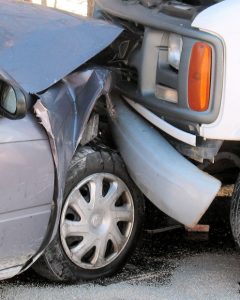If you’re injured in a car accident or have lost someone you love in a crash, one of the questions important to ask is whether the negligent driver was acting in the course and scope of their employment. This matters because if they were furthering the interests of their employer at the time of the crash, the employer could be held vicariously liable. 
Vicarious liability of employees is allowed thanks to the doctrine of respondeat superior, which is Latin for, “let the master answer.” Vicarious liability does not require a showing that the company necessarily did anything wrong. Rather, one must show the employee – acting on behalf of the employer – was negligent. We see this a lot in trucking accident cases or bus accident cases, but it can also be applied with many other types of workers as well. In our increasingly mobile workforce, it’s not uncommon for employees to be on the move regularly throughout the course of their work day, or to be running errands for their employer outside of normal business hours.
In cases of professional drivers, vicarious liability may be easy to establish because it’s the employee’s job to drive. If they were on-the-clock, it’s pretty easily settled. However, there are some nuances to this. Some of the same legal doctrines that apply in workers’ compensation cases can come into play in these cases too.
For instance, the “coming-and-going rule” so often cited in workers’ compensation cases holds that one is generally not acting in the course and scope of employment while commuting to and from work.
This very issue was raised recently in the California Court of Appeal, First Appellate District, Division Four. According to court records, the primary question is whether defendant company’s employee, who was involved in an early morning fatal crash, was acting in the course and scope of employment at the time.
The crash in question occurred in December 2012, when the employee’s vehicle struck another. The passenger in that other vehicle died as a result of the crash, which occurred around 3:30 a.m. The employee owned the vehicle he was driving. The responding officer interviewed defendant driver first on scene and three more times over the course of the next several days. In the first interview, he told the officer he was driving to his office on his night off to collect resumes for an upcoming interview. While it might sound odd that someone would do such a thing in the middle of the night, this worker routinely worked the graveyard shift.
Estate of decedent sued both the driver and his employer for wrongful death, alleging vicarious liability of the employer.
A friend of defendant driver’s told investigators that around midnight, several hours before the crash, defendant driver told him he was going to the office to do something important for work.
During deposition, defendant driver gave several reasons for the trip, once saying he needed to get some old resumes he’d left in his mailbox, along with some personal belongings on the way to visit his grandmother. He also said he needed to pick up the resume of his unemployed friend. Defendant employer, however, insisted he was not on the clock. The company moved for summary judgment as a matter of law. Trial court ruled in favor of plaintiff, and the employer appealed. The appellate court reversed, finding the coming-and-going rule precluded the firm’s liability in this case.
While the scope of employment is broadly interpreted both there in California and in Florida, the primary question is whether an employee was directly or indirectly serving his employer. In this case, the court determined, the worker was not serving his employer’s interests, and thus the company could not be vicariously liable.
Call Associates and Bruce L. Scheiner, Attorneys for the Injured, at 1-800-646-1210.
Additional Resources:
Morales-Simental v. Genentech, Oct. 19, 2017, California Court of Appeal, First Appellate District, Division Four
More Blog Entries:
Company UIM Benefits Affirmed in Rear-End Collision Case, Oct. 25, 2017, Fort Myers Car Accident Lawyer Blog
 Florida Injury Lawyer Blog
Florida Injury Lawyer Blog





